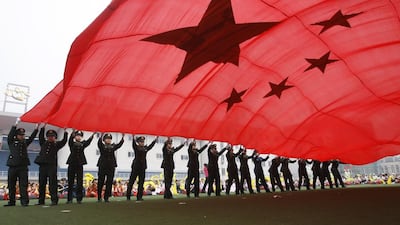Xi Jinping has left the Middle East, but the first visit of his presidency to the region has set pundits wondering if the Chinese dragon is preparing to replace the American eagle.
Here's the short answer: it is not. Even if it were, the Arabs will not find a Chinese superpower more to their liking than the US one.
Much as the Middle East dislikes US foreign policy, Chinese foreign policy will bring with it its own problems. In particular, the Chinese policy of "non-interference" in the affairs of other nations, if applied to the Middle East, would not please the Arabs.
Here's why. China has touted its policy of non-interference for decades. On one level, that sounds good – after all, non-interference in the affairs of other nation states is one of the pillars of the global system.
Perhaps a better way of thinking about it would be remaining neutral in the face of threats to allies. And that kind of “neutrality” is emphatically not what the Arabs want.
Neutrality, understood in that way, has two serious problems for the Middle East. It takes no sides in disputes and it entrenches the status quo. Neither of which is what the region needs right now.
Start with the disputes. As China's global power rises, it gains greater leverage over international institutions such as the UN and over individual countries. As trade and cooperation increase between Arab countries and China, there is a natural next step where, having gained significant influence in Beijing, the Arab world will look to China to use its influence around the world in their favour. That's what allies do, they support their allies.
What happens then, if China maintains its policy of strict neutrality? What happens when the Arab world asks China to use its influence at the UN to support the Palestinians – and China says no, on the ground of neutrality?
There isn't even a need to dwell on hypotheticals. Today, China, by supporting the status quo in Syria, is implicitly supporting the regime of Bashar Al Assad. If China had its way, the regime would survive, despite the carnage it has unleashed, simply because it was there in the first place.
This type of strict neutrality is already apparent. The timing of Mr Xi's visit is no accident, flying into the Middle East just after sanctions on Iran are lifted, thereby maintaining strict neutrality between Saudi Arabia and Iran, and with the US.
That isn't what the Arab world seeks. The main criticism the Gulf states have of their ally the US over Iran is that America does not appear willing to recognise their concerns over Iranian meddling. A strictly neutral China would be even worse than a disengaged America.
That leads to the second major problem with neutrality. It freezes the development of regions at a particular moment in time.
Chinese leaders talk a great deal about cooperation and development. The Chinese foreign ministry released its first Arab policy paper ahead of Mr Xi's visit, and the two words appear more than 200 times.
But by development, China means economic rather than political development, even though the two often go hand in hand.
Economic development alone, without political development of the institutions and organisations of political representation, can take place only once a society has reached a settled view of the political compact.
To put it a different way, it is only when a country has a settled view of the relationship between the structures of government and the people that economic development can occur without parallel political development.
In China, there does appear to be, broadly, a settled view, despite occasional voices of dissent.
But in much of the Arab world, political development is ongoing. All of the countries of the Arab Spring had their revolutions because political structures did not reflect the aspirations of the country. Economics played a significant part, but so did representation.
Chinese neutrality in 2011 would have meant siding with Mubarak against Tahrir Square, with Ben Ali against the people in Avenue Habib Bourghuiba. It would have meant the perpetuation of the rule of Muammar Qaddafi and Ali Abdullah Saleh.
Outside of a handful of countries in the region – interestingly, almost all of them monarchies – there is not yet a settled view of political development. Strict neutrality would freeze most of the political development of the Arab republics – the precise reason that led to the uprisings.
All of this is a long way away. America has not left the region and the Chinese footprint is still very small. As China's power rises, it will find – as it is already finding in Africa – that non-interference becomes much harder with stronger ties. Relationships can be built with economics, but they can be defended only with politics.
If, when the moment arrives, China is unwilling to side with its allies, the Arabs will rapidly find a declawed Chinese dragon unwelcome.
falyafai@thenational.ae
On Twitter: @FaisalAlYafai


